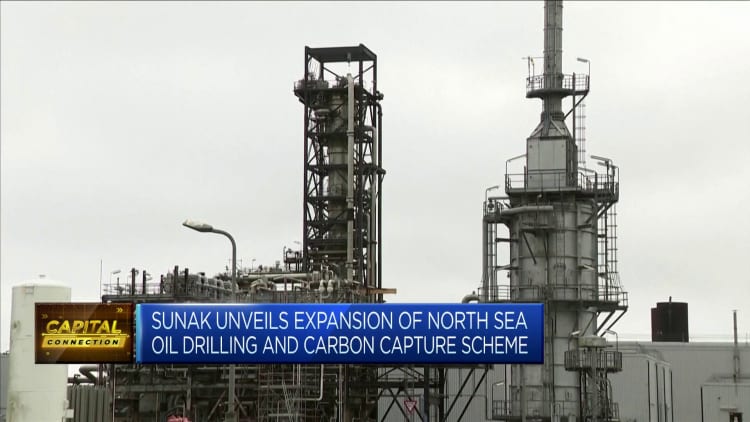LONDON — British regulators on Wednesday gave approval for Norway's energy giant Equinor to develop the controversial U.K. offshore Rosebank field in the North Sea, just off the northwest coast of the Shetland Islands.
The North Sea Transition Authority said it has also given the necessary consent.
The U.K. government said it had given operator Equinor and British energy company Ithaca Energy — which hold respective 80% and 20% stakes in the field — permission to proceed following "extensive scrutiny by the regulators," including regarding the environmental impact of the development.
Ithaca Energy shares jumped 7% by 9 a.m. London time, following the announcement, with Equinor shares higher by roughly 1%. Rosebank stands as the largest untapped field in the U.K.
Equinor says the project will be pursued in two phases and estimates it will create £8.1 billion ($9.8 billion) of direct investment. The company expects the field's start-up stage to take place over 2026-27 and estimates that Rosebank's recoverable resources are over 300 million barrels of oil for its two phases.
"We are investing on our world-leading renewable energy but, as the independent Climate Change Committee recognise, we will need oil and gas as part of that mix on the path to net zero and so it makes sense to use our own supplies from North Sea fields such as Rosebank," U.K. Energy Security and Net Zero Secretary Claire Coutinho said in a statement.
Finance Minister Jeremy Hunt said: "We are accelerating renewables and nuclear power, but will still need oil and gas for decades to come — so let's get more of what we need from within British waters."
The Rosebank development has faced repeated delays and intense public backlash amid questions over its environmental impact.
Burning Rosebank's oil and gas would produce over 200 million metric tons of CO2, #StopRosebank campaign activists say, on Wednesday pledging in a statement that the "fight is far from over" and the group will "pressure the UK to reverse this terrible decision, and use every tool we can to stop this field," as "climate justice demands nothing less."
Green Party Member of Parliament, Caroline Lucas, echoed these feelings on Wednesday.
"This is morally obscene. It won't improve energy security or lower bills - but it will shatter our climate commitments & demolish global leadership. Govt is complicit in this climate crime - as is Labour unless they pledge to do all possible to revoke it," she said on the X social media platform, previously known as Twitter.
The Rosebank development approval comes after Britain in July confirmed plans to issue hundreds of new oil and gas licenses in the North Sea, despite its stated target to decarbonize all of the national sectors of the economy by 2050.

Compounding concerns over Westminster's commitment to transition, British PM Rishi Sunak last week revealed his government would postpone a ban on the sale of new gasoline and diesel cars by five years, to a new 2035 deadline.
"We don't support Rosebank," the opposition Business Secretary Jonathan Reynolds said in a televised Sky News interview in the wake of the announcement. "We think the priority for the country should be transitioning away from fossil fuels, partly because of the volatility of the price in fossil fuels, and we've seen since Russia's invasion of Ukraine just what that's meant, not just for heating prices, but for electricity, because our electricity system is pinned, it's matched to that gas price. So real energy security will only come from moving to nuclear, to renewables, to technologies that will insulate us from those pressures."
Energy security has stepped into the forefront of the European policy agenda after Russia's full-scale invasion of Ukraine and subsequent sanctions deprived regional buyers of Moscow's seaborne crude and refined oil products.
"By approving Rosebank, Rishi Sunak has confirmed he couldn't care less about climate change. As we've heard repeatedly, our world can no longer sustain new oil and gas drilling. And when we're witnessing scorching temperatures, wildfires, devastating flooding and heatwaves in our seas, it could not be clearer that this is a decision by the Prime Minister to add more fuel to the fire," said Tessa Khan, executive director of the Uplift activism group, in an emailed statement.
"Rosebank will do nothing to lower fuel bills or boost UK energy security. "

